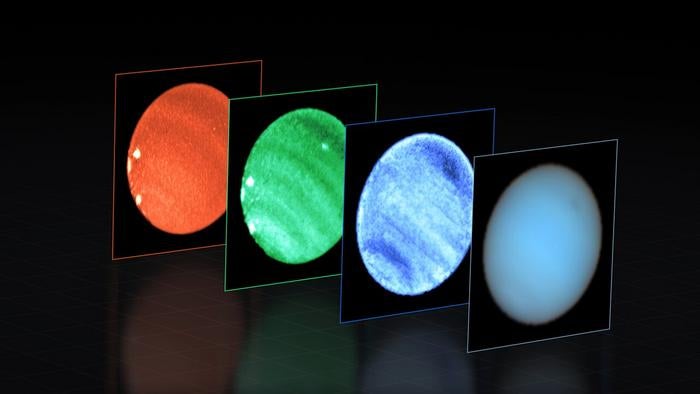Mysterious ‘dark spot’ on Neptune seen from Earth for the first time
Features could previously only be seen by sending spacecraft to planet

Your support helps us to tell the story
From reproductive rights to climate change to Big Tech, The Independent is on the ground when the story is developing. Whether it's investigating the financials of Elon Musk's pro-Trump PAC or producing our latest documentary, 'The A Word', which shines a light on the American women fighting for reproductive rights, we know how important it is to parse out the facts from the messaging.
At such a critical moment in US history, we need reporters on the ground. Your donation allows us to keep sending journalists to speak to both sides of the story.
The Independent is trusted by Americans across the entire political spectrum. And unlike many other quality news outlets, we choose not to lock Americans out of our reporting and analysis with paywalls. We believe quality journalism should be available to everyone, paid for by those who can afford it.
Your support makes all the difference.Scientists have seen one of the mysterious “dark spots” on Neptune from Earth for the first ever time.
Researchers spotted the feature using the European Southern Observatory’s Very Large Telescope, or VLT. Using that telescope, astronomers were able to examine a large dark spot – which was joined by a smaller, bright spot, they said, of a kind that has never seen before.
Scientists still do not know why those spots form on Neptune’s blue atmosphere. But they hope that the new observations could help answer questions about their origin.
“Since the first discovery of a dark spot, I’ve always wondered what these short-lived and elusive dark features are,” said Patrick Irwin, professor at the University of Oxford and lead investigator of the study.
It has already helped rule out one possibility: that the dark spots are caused when the clouds on the planet clear. The observations instead suggest that the spot is formed when air particles make a layer below the main one go darker, caused by ice and haze mixing in the atmosphere.
Understanding the spots has been difficult because they leave the planet’s surface as mysteriously as they arise. They have also been difficult for researchers to actually examine, given the difficulty of spotting them through telescopes.
Previously, scientists were forced to send spacecraft to see the spots, and the first was observed in 1989, when Nasa’s Voyager 2 flew past. It disappeared a few years later.
In recent years, scientists have been able to examine them with the Hubble Space Telescope, which has seen more spots on the atmosphere. When it did so, astronomers were able to point ground-based telescopes towards them, allowing for more detailed research.
“This is an astounding increase in humanity’s ability to observe the cosmos,” said Michael Wong, a researcher at the University of California, Berkeley and a co-author on the paper.
“At first, we could only detect these spots by sending a spacecraft there, like Voyager.
“Then we gained the ability to make them out remotely with Hubble. Finally, technology has advanced to enable this from the ground.”
The new observations allowed scientists to examine the spot using the VLT’s Multi Unit Spectroscopic Explorer, which let them split the light from Neptune and the spot into its component colours. That in turn means that astronomers can understand the height at which the spot sits, and how the atmosphere is composed.
As well as helping examine the dark spots, scientists also saw a surprise result: another, entirely new kind of bright spot. “In the process we discovered a rare deep bright cloud type that had never been identified before, even from space,” said Wong.
The work is described in a new paper, ‘Cloud structure of dark spots and storms in Neptune’s atmosphere’, published in Nature Astronomy.
Join our commenting forum
Join thought-provoking conversations, follow other Independent readers and see their replies
Comments